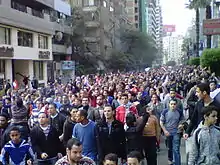2011 in Egypt
| |||||
| Decades: |
| ||||
|---|---|---|---|---|---|
| See also: | Other events of 2011 List of years in Egypt | ||||
Events from the year 2011 in Egypt
Incumbents
- President: Hosni Mubarak (until 11 February), Supreme Council of the Armed Forces (starting 11 February)
- Prime Minister:
- until 29 January: Ahmed Nazif
- 29 January-3 March: Ahmed Shafik
- 3 March-7 December: Essam Sharaf
- starting 7 December: Kamal Ganzouri
Events
January

The "Day of Revolt" on 25 January
- January 1 – The 2011 Alexandria bombing: An attack on Coptic Christians was carried out a few minutes into New Year's Day 2011, in Alexandria. 23 people died as a result of the attack, all of them Coptic Christians.[1] Some 97 more people were injured.[2] This was the deadliest act of violence against Egypt's Christian minority in a decade, since the Kosheh massacre in 2000 left 21 Copts dead.[3]
- January 25 – The start of the 2011 Egyptian revolution: An ongoing series of street demonstrations, riots, and violent clashes began on this day, selected to coincide with the National Police Day holiday. The protests began with tens of thousands marching in Cairo and several other cities in Egypt.[4] While localised protests had been common in previous years, the 2011 protests have been the largest demonstrations seen in Egypt since the 1977 Bread Riots and unprecedented in scope.[5]
- January 29 – Hosni Mubarak appoints Omar Suleiman as his Vice President.
February

Hundreds of thousands of people celebrate in Tahrir Square when Hosni Mubarak's resignation is announced
- February 5 – An explosion was reported at the Arab Gas Pipeline, which exports Egyptian natural gas to the Middle East, in North Sinai Governorate.[6][7][8] As a result, supplies to Israel and Jordan were halted.[9] State television laid the blame on perpetrators "who took advantage of the unstable security situation in the country."[7] However, according to the head of Egyptian Natural Gas Company, the explosion was caused by a gas leak and not by a terrorist attack.[10]
- February 11 – After 18 days of widespread violent protests, Egyptian President Hosni Mubarak resigns leaving control of Egypt in the hands of the military until a general election can be held. His resignation was met with jubilant scenes from Tahrir Square.[11]
- February 24 – Mohamed ElBaradei met with several opposition leaders and notable intellectuals at his home in Cairo. The meeting was concluded with an announcement for the formation of a new non-party-political movement called the "National Association for Change." The movement aims for general reforms in the political scene and mainly article 76 of the Egyptian constitution, which places restrictions on free presidential elections, especially when it comes to independent candidates.[12]
- February 24 – Foreign Minister Ahmed Abul-gheit announced that former Vice President Omar Suleiman had survived an assassination attempt on February 4, 2011, when a group of unidentified men opened fire on Suleiman's car from a stolen ambulance in Cairo.[13] One of Suleiman's bodyguards was killed in the attack.[13]
March
- March 3 – Essam Sharaf was appointed Prime Minister of Egypt by the Supreme Council of the Armed Forces, replacing Ahmed Shafik.
- March 3 – Minister of State for Antiquities Affairs Zahi Hawass resigned after posting a list on his personal website of dozens of sites across Egypt that were looted during the 2011 revolution.[14]
- March 7 – It was announced that Mohamed ElBaradei intended to run for the presidential elections.[15]
June
References
- "أسماء ضحايا ومصابى حادث انفجار الإسكندرية". El Yom El Sabe. 2 January 2011. Archived from the original on 4 January 2011. Retrieved 2 January 2011.
- "Egypt bomb kills 21 at Alexandria Coptic church". BBC News Online. 1 January 2011. Archived from the original on 1 January 2011. Retrieved 1 January 2011.
- Fahim, Kareem; Stack, Liam (1 January 2011). "Fatal Bomb Hits a Church in Egypt". The New York Times. Retrieved 3 January 2011.
- "Net down, special forces deployed in Cairo as Egypt braces for protests" - News Limited - Retrieved 1 February 2011.
- Murphy, Dan (25 January 2011). "Inspired by Tunisia, Egypt's protests appear unprecedented". The Christian Science Monitor. Archived from the original on 30 January 2011. Retrieved 30 January 2011.
- Sweilam, Ashraf (2011-02-05). "Egypt TV reports explosion, fire at gas pipeline in northern Sinai Peninsula near Gaza Strip". Los Angeles Times. Associated Press. Retrieved 2011-02-05.
- Blair, Edmund (2011-02-05). "Leaders inside, outside Egypt seek exit from impasse". Reuters. Retrieved 2011-02-05.
- Issacharoff, Avi; Ravid, Barak (2011-02-05). "Egypt holds gas supply to Israel and Jordan after pipeline explosion". Haaretz. Archived from the original on 5 February 2011. Retrieved 2011-02-05.
- "Egypt gas pipeline attacked; Israel, Jordan flow hit". Reuters. 2011-02-05. Retrieved 2011-02-05.
- Kiley, Sam (2011-02-05). "Gas Leak Explosion At Egypt-Israel Facility". Sky News. Retrieved 2011-02-05.
- "Hosni Mubarak resigns as president". AlJazeera. 11 February 2011. Archived from the original on 11 February 2011. Retrieved 11 February 2011.
- ElBaradei to form 'national association for change'
- "Egypt confirms assassination attempt on Suleiman". Haaretz. 2011-02-24.
- Durney, Mark. "Breaking News NYTIMES: Zahi Hawass Resigns". Art Theft Central. Retrieved 3 March 2011.
- "البرادعي يعلن ترشحه للرئاسة". Masrawy.com. 2011-03-07. Archived from the original on 2011-03-14. Retrieved 2011-03-24.
- "Report: Egyptian reactor leaked radioactive liquid". June 9, 2011.
- "Egypt council of ministers denies Inshas radiation leak". June 8, 2011.
This article is issued from Wikipedia. The text is licensed under Creative Commons - Attribution - Sharealike. Additional terms may apply for the media files.
